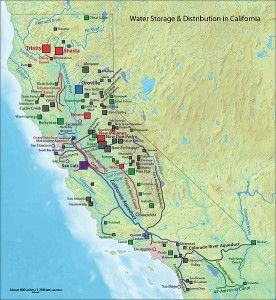A bill to address California’s drought and future water supply in the House of Representatives has Gov. Jerry Brown angry. Brown said the water bill is “an unwelcome and divisive intrusion” into California’s effort to manage the state’s drought, the Sacramento Bee reported Monday night.
H.R. 3964 by California Congressmen David G. Valadao, CA-21, Devin Nunes, CA-22, and Kevin McCarthy, CA-23, is a comprehensive bill to resolve the water crisis in California, according to the congressmen.
“H.R. 3964 is an unwelcome and divisive intrusion into California’s efforts to manage this severe crisis,” Brown wrote in a letter to the Congressmen. “It would override state laws and protections, and mandate that certain water interests come out ahead of others. It falsely suggests the promise of water relief when that is simply not possible given the scarcity of water supplies.”
H.R. 3964 would undo years of environmental dominance in California’s water priorities.
Brown said the bill would “re-open old water wounds undermining years of progress toward reaching a collaborative long-term solution to our water needs.”
Valadeo, Nunes and McCarthy say the bill would undo a San Joaquin River restoration program, would improve water access for Valley farms. The San Joaquin restoration program to restore flows to the San Joaquin River from Friant Dam to the confluence of Merced River and restore a self-sustaining Chinook salmon fishery.
What Brown could be angry about is the California Department of Water Resources announced in November that the Central Valley would only get five percent of the water it needs in 2014. Valadeo’s office reported Thursday, U.S. Bureau of Reclamation Commissioner Michael Connor upheld Valadao’s position, along with other Central Valley lawmakers, regarding rescheduled water deliveries for Central Valley Project water contractors. The letter to the Bureau urged the Administration to reconsider halting rescheduled water deliveries to San Joaquin Valley farmers. The letter stated strong opposition to the use of rescheduled water to meet other Central Valley Project water delivery needs at the expense of farmers and contractors in the Valley.
In an interview I did in November with Sen. Andy Vidak, R-Hanford, he explained:
“California has had two dry years, the Central Valley is suffering under the San Joaquin River Restoration Program, a federal program to restore flows to the San Joaquin River from Friant Dam to the confluence of Merced River, in order to restore Chinook salmon in the river. “Billions are being spent on dry salmon runs,” Vidak said. “We’re spending $2 million to $3 million per fish!”
“H.R. 3964, the Sacramento–San Joaquin Valley Emergency Water Delivery Act restores water reliability to California communities by codifying the bipartisan Bay-Delta Accord,” Valadeo’s website says. “It also reforms onerous federal laws – such as the Central Valley Project Improvement Act and the San Joaquin River Restoration Settlement Act – that have severely curtailed water deliveries and resulted in hundreds of billions of gallons of badly needed water being flushed into the ocean.” Valadeo represents Kings County and portions of Fresno, Tulare, and Kern Counties, three of the hardest-hit counties in the recession and drought.
“The current California drought is a crisis exacerbated by the failure of government to ensure water flows to our communities and farms,” said Rep. McCarthy. “Today, led by my good friend Rep. David Valadao, the entire California Republican delegation in the House introduced legislation to put families before fish. One more day cannot go by without addressing the shortage of a resource so precious to our economy and wellbeing. It is time, as representatives for the entire state, that Senator Boxer and Senator Feinstein support drought stricken Californians and get behind this legislation.”
Valadeo’s website recently reported House Republicans passed comprehensive water policy reform legislation for California (H.R. 1837) in February 2012. The bill would have mitigated the water crisis now going on in the Central Valley. However, the bill died in the Senate “due to the opposition of California’s Democratic Senators,” Valadeo’s website reported. “No Senate hearings were held, nor were any amendments offered or alternatives proposed. Furthermore, the Senate recently prevented the addition of emergency drought relief provisions for California in the Farm Bill,” the website said.


